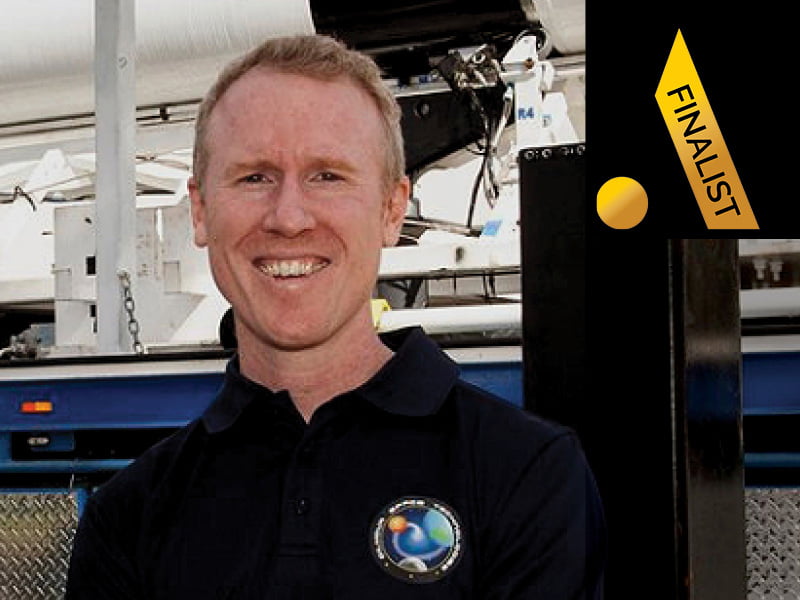Situated 25 kilometres north of Bowen in North Queensland is Abbot Point. Known for its port, Abbot Point will soon become better known for something else, a rocket launch site.
What started as a childhood fascination with space is now a reality for Gilmour Space Technologies founder and chief executive, Adam Gilmour.
With the approval of the Queensland government, the Gold Coast-based space-tech startup is set to launch its maiden commercial rocket, Eris, next year.
When Eris delivers its payload of satellites to low earth orbit, it will mark the culmination of years of hard work, risk-taking, raising capital and a desire for Australia to be part of the burgeoning global space industry.

For Adam Gilmour, it was a trip to the Kennedy Space Center as a child in the late 70s that started his life-long fascination with space.
“My earliest memories of my childhood were my parents taking me to the Kennedy Space Center after the last Apollo missions,” Mr Gilmour said.
“Going to the moon was fresh in everybody’s mind and it was a common thought that it was inevitable that people would keep going to the Moon, and to Mars next. But that went nowhere because of the Space Shuttle,” he said.
After global interest in space travel waned, Mr Gilmour went into finance but always kept a keen eye on the space industry.
As privately backed space technology companies began to emerge in the early 2000s he sensed an opportunity to chase his dreams was just around the corner.
“I started to think about starting a space company before 2010,” Mr Gilmour says. The GFC was a setback, but he still pushed on.
“I just kept looking at the industry, going to space conferences. Trying to figure out, where were the pressure points? Where were the pain points? What was the bottleneck? And it was so clear that it was access to space.”
“It was incredibly expensive to get to space. So I thought, ‘right I’m going to develop a launch vehicle’, So I started down that path.”
Mr Gilmour immersed himself in learning about rocket science and spacecraft technology, sourcing journals and books from the reading lists of NASA and MIT.
“That gave me to confidence to think this isn’t a pipe dream, I kind of know what I’m doing now. I know what the core technology is, and I now have enough knowledge to start hiring people, hiring engineers and laying it all out,” he said.
And with that, Gilmour Space Technologies was born in 2012.
The company has raised $87 million through venture capital and has grown to 80 employees, with that number expected to grow to 120 in 2022.
During its Series C investment round earlier this year, Gilmour Space raised $61 million. Investors ranged from Fine Structure Ventures, a venture capital fund affiliated with FMR LLC, the parent company of Fidelity Investments, as well as Australian venture capital firms Blackbird and Main Sequence, and Australian superannuation funds Hostplus, HESTA and NGS Super.
The company has also received $3.5 million in government/research grants from the soveriegn industrial capability program (SICP), the cooperative research centre projects (CRCP), and through the Advanced Manufacturing Growth Centre (AMGC).
Gilmour Space offers customers affordable and reliable rocket launches into low-orbit space thanks to their proprietary hybrid propulsion technologies, which Mr Gilmour describes as a “game-changer” because it allows them to cut down development time.
Now out of the R&D phase of their company’s lifecycle, Gilmour Space is export ready. The company has already agreed to provide other Australian startups like South Australia-based satellite manufacturer, Fleet Space Technologies, with the ability to get their satellites into orbit.
Mr Gilmour predicts that small satellite technology will become a staple of space infrastructure and that demand for space access will grow exponentially over the coming years. The space industry is currently worth around US$350 million and is predicted to grow to US$1.4 trillion in the next 10-20 years.
There is also a massive opportunity for other satellite-related service.
“What a lot of people don’t realise about satellites is that they don’t just go up and stay there. They have fixed lifetimes and get degraded and un-operational,” he said.
“Once you put up ten-thousand satellites, you have to service a thousand a year as they degrade and continue to upgrade them. I don’t think people understand the opportunity – we’re talking companies globally about launching from Australia.”
Gilmour Space Technologies is a finalist for the 2021 InnovationAus awards in the Space & Remote Automation category.
Do you know more? Contact James Riley via Email.
